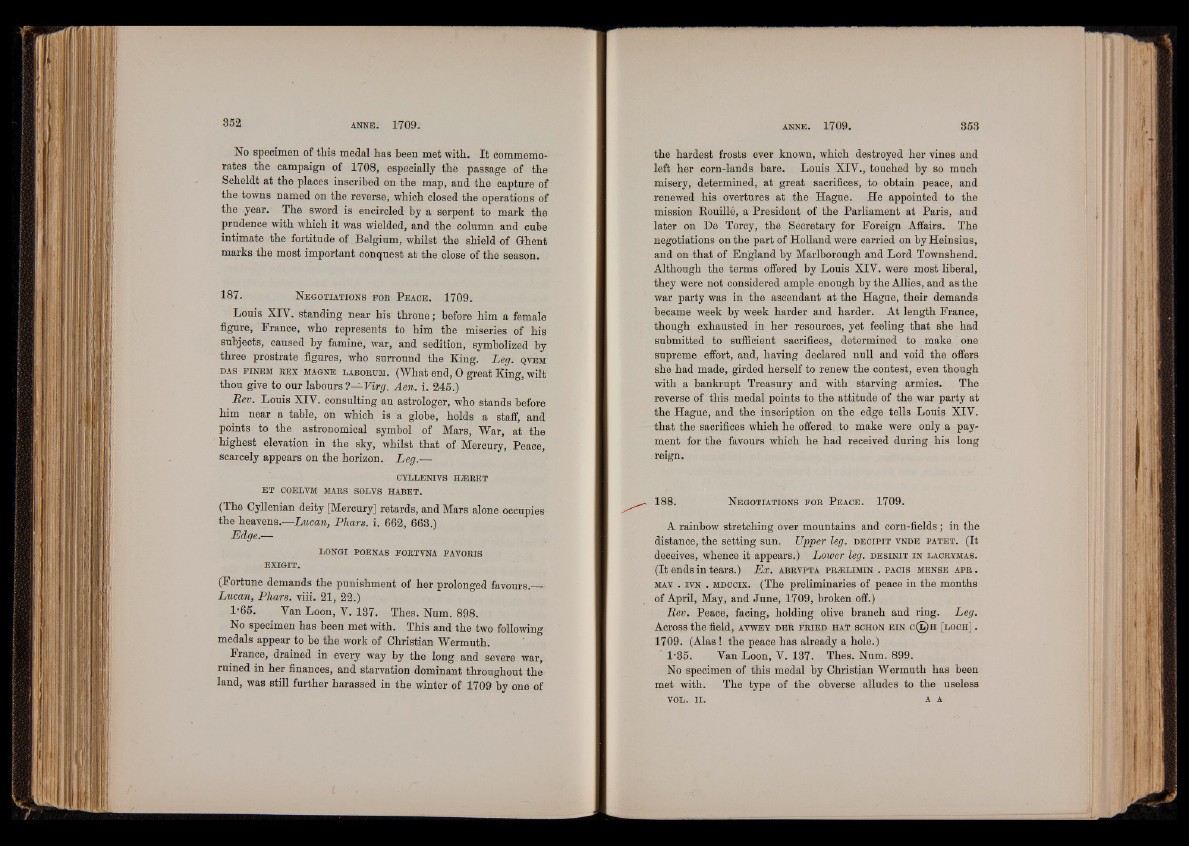
No specimen of this medal has heen met with. It commemorates
the campaign of 1708, especially the passage of the
Scheldt at the places inscribed on the map, and the capture of
the towns named on the reverse, which closed the operations of
the year. The sword is encircled by a serpent to mark the
prudence with which it was wielded, and the column and cube
intimate the fortitude of Belgium, whilst the shield of Ghent
marks the most important conquest at the close of the season.
187. N e g o t ia t io n s f o e P e a c e . 1709.
Louis XIY. standing near his throne; before him a female
figure, France, who represents to him the miseries of his
subjects, caused by famine, war, and sedition, symbolized by
three prostrate figures, who surround the King. Leg. qvem
das f in e m e e x m ag n e l a b o eum . (What end, 0 great King, wilt
thou give to our labours ?— Virg. Aen. i. 245.)
Bev. Louis XIY. consulting an astrologer, who stands before
him near a table, on which is a globe, holds a staff, and
points to the astronomical symbol of Mars, War, at the
highest elevation in the sky, whilst that of Mercury, Peace,
scarcely appears on the horizon. Leg.—
CYLLENIVS HJEEET
E T COELVM MAES SOLVS HABET.
(The Cyllenian deity [Mercury] retards, and Mars alone occupies
the heavens.—Lucan, Phars. i. 662, 663.)
Edge.—
LONGI POENAS FOETVNA FAVOEIS
EXIGIT.
(Fortune demands the punishment of her prolonged favours.__
Lucan, Phars. viii. 21, 22.)
1-65. Yan Loon, Y. 137. Thes. Num. 898.
No specimen has been met with. This and the two following
medals appear to be the work of Christian Wermuth.
France, drained in every way by the long and severe war,
ruined in her finances, and starvation dominant throughout the
land, was still further harassed in the winter of 1709 by one of
the hardest frosts ever known, which destroyed her vines and
left her corn-lands bare. Louis XIY., touched by so much
misery, determined, at great sacrifices, to obtain peace, and
renewed his overtures at the Hague. He appointed to the
mission Rouillé, a President of the Parliament at Paris, and
later on De Torcy, the Secretary for Foreign Affairs. The
negotiations on the part of Holland were carried on by Heinsius,
and on that of England by Marlborough and Lord Townshend.
Although the terms offered by Louis XIV. were most liberal,
they were not considered ample enough by the Allies, and as the
war party was in the ascendant at the Hague, their demands
became week by week harder and harder. At length France,
though exhausted in her resources, yet feeling that she had
submitted to sufficient sacrifices, determined to make one
supreme effort, and, having declared null and void the offers
she had made, girded herself to renew the contest, even though
with a bankrupt Treasury and with starving armies. The
reverse of this medal points to the attitude of the war party at
the Hague, and the inscription on the edge tells Louis XIV.
that the sacrifices which he offered to make were only a payment
for the favours which he had received during his long
reign.
188. N e g o t ia t io n s f o e P e a c e . 1709.
A rainbow stretching over mountains and corn-fields; in the
distance, the setting sun. Upper leg. d e c ip it Vn d e p a t e t . (It
deceives, whence it appears.) Lower leg. d e s in it in lac bymas.
(It ends in tears.) Ex. a b ev pta p b j s l im in . pa c is m e n s e a p e .
may . iv n . m d c c ix . (The preliminaries of peace in the months
of April, May, and June, 1709, broken off.) ,
Bev. Peace, facing, holding olive branch and ring. Leg.
Across the field, avwey d e E f b ie d h a t sc h o n e in c© h [lo c h ] .
1709. (Alas ! the peace has already a hole.)
1‘35. Van Loon, V. 137. Thes. Num. 899.
No specimen of this medal by Christian Wermuth has been
met with. The type of the obverse alludes to the useless
VOL. I I . - A A